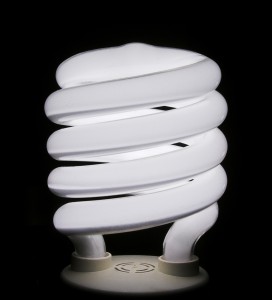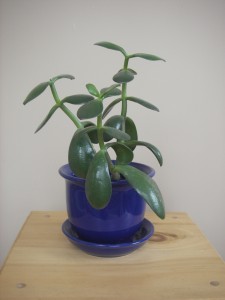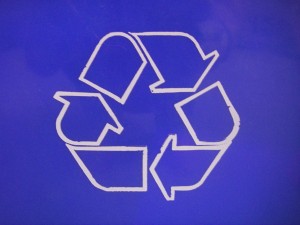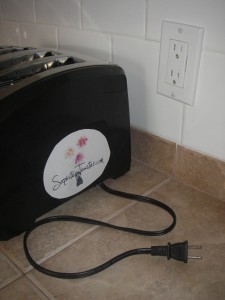When living in an apartment you can’t exactly install a solar panel, which is just about the grandest gesture of environmental responsibility someone can make right now, or buy energy efficient appliances. This hindrance doesn’t mean you have to forsake Mother Earth during this stage of your life. There are countless options still available to the green apartment dweller.
The first thing many people do when they move into a new apartment is paint the walls a more exciting colour. White walls are so over. If your landlord allows you to paint, you can use low or no VOC paints. More and more stores are starting to carry these products as demand increases. Home Depot has the largest selection that I could find. Benjamin Moore also offers a selection of low or no VOC paints. These paints will cost you a little more money, but they are well worth it. Not only does the old style of paint release toxic fumes into the environment and into the painter during the painting session, but they also continue to release these toxins for years to come.
Another quick and easy way to help out our environment is to replace burned out incandescent light bulbs with compact fluorescent light bulbs. Although these bulbs cost more initially, they will save you money in the long run. These bulbs use less energy; therefore your energy bills will be lower. They also last longer than the old style of light bulbs, meaning you don’t have to buy new ones as often. Today, these bulbs can be found anywhere that sells light bulbs.
It calls for commitment and devotion to the cause to make sure you are consistently disposing of objects correctly. Recycling is one of the most important things you can do for the health of the planet. The list of products that can be recycled is always growing. These days, I toss more things into the recycling or compost than I do the garbage. Composting while living in an apartment is very easy for me since moving to a city that has a weekly compost pick-up program. If your city does not have this system but you still want to compost, you can look for a private group that would be happy to accept your contribution. Some things, like batteries, compact fluorescent light bulbs and electronics, are recyclable but most be taken to special locations. Batteries and light bulbs can be taken to Home Depot. Electronics like computers, stereos, DVD players, etc. can be taken to collection sites or to electronic stores on special days.
A big and beautiful way to help out the environment is to reupholster and reuse old furniture. A beloved chair or couch, with good bones, can easily be restored to its former charm. The task is not as daunting as it may seem. Many books on the subject can be found in any book store or library. The best part is; you get to pick almost any fabric in any colour than you want. Old wooden furniture can be sanded and re-stained to hide any abuse they have incurred over the years. If you must buy new furniture, look for pieces that are made from sustainable or recycled materials.
Many apartment living situations do not allow for gardening space, but don’t despair; you can bring the organic garden inside. Growing potted plants in your home helps to naturally oxygenate the room. A small, tasty herb garden can be grown in your kitchen window, and if you are lucky enough to have a balcony, you can even grow your own organic vegetables. Tomatoes, beans and peas can be grown in a large flower pot and potatoes can be grown in a standard bag of soil or compost.
Switching to environmentally friendly cleaning products is another way live green from an apartment. I like to use Green Works because it is inexpensive, is sold along side every other brand and works just as well as any other cleaning product. I buy the concentrate and dilute it myself to save money and packaging. Another benefit to using products like this, aside from the obvious, is that you don’t need to wear gloves or ‘use only in well ventilated areas’ because there are no toxic chemicals being used. Another nice thing is you don’t have to worry about letting it go down the drain and into the water system.
No matter where you live, you can easily control what food you choose to buy. Choosing to buy food that was grown or processed locally is economical and environmental. This means you will have to eat fruits and vegetables in their proper season, which becomes easy to stick to once you discover how much better they taste when they are fresh. Eating locally vastly decreases the amount of fuel used to ship the food to your local stores and restaurants.
An additional way you can protect the environment when food sopping is to buy the products that have less packaging than others. Even if you plan to recycle that packaging, you can save the environment by skipping a step and not using the energy it takes to re-fabricate the new packaging.
Don’t forget to take your food home in reusable shopping bags. If you forget your bags, you can recycle the plastic bags. Some stores have a program set up where you can bring the plastic bags back to be recycled if your city does accept the bags. A growing number of stores are now offering biodegradable bags, which I use as garbage bags. You do need to wash these bags every so often. It is also a good idea to designate one of your bags as your ‘meat and dairy only’ bag to avoid cross-contamination of other foods.
Using reusable food storage containers is a great way to live green. If you spend more money when you initially purchase the containers, you will save more in the long run. Most name brand containers come with a lifetime guarantee, meaning if any of the containers break, you get a new one for free. You will also save money in not having to continuously buy baggies. Now, there are those few times when a container just won’t do, and you will need to use a baggie. To offset this wastefulness a little bit, I reuse the baggies a few times before discarding them. You just need to find a way to remember which baggies were once used for meat and to make sure you don’t reuse them for anything but meat, I simply write “meat” on these baggies.
An immense way to help out our environment is to consciously conserve water throughout your day. This could be done by turning off a faucet when you are brushing your teeth, using only as much water as you need when doing the dishes, and not dawdling in the shower. If you find you have a dripping or leaking faucet make sure you get your landlord in right away to get it fixed, a broken faucet can waste a surprisingly large amount of water.
Even though you can’t control whether you have energy efficient appliances or not, it isn’t the end of the world, you can still use energy efficient electronics. Many types of televisions in many brands are now available with energy efficient certification. Other major electrons like computer towers and monitors are also available, with more products being developed every day as we demand more green solutions.
Now that you have energy efficient electronics, the next step is to remember to unplug them when they are not in use. Anything plugged in to an outlet is drawing electricity, even if you have it turned off. This is commonly referred to as phantom power, and is quite avoidable. One option is to unplug anything that is not in use, or at least unplug everything overnight and defiantly if you go on vacation. Another option is to plug multiple common electronics, like everything you have turned on when you use your computer, into a power bar that has a switch, then turn off the power bar when your electronics are not in use. Power bars have become fairly sophisticated as of recent and are now available in energy efficient models that do not draw phantom power.
You can extend this procedure to other areas of your apartment. Turning off lights when you leave a room can do a lot for energy conservation. You can even use candles for lighting a few nights a week to create a romantic, energy saving atmosphere. Another way to save energy is to keep your refrigerator well stocked because the fuller a modern refrigerator is, the more efficiently it will run and the cooler it will keep.
Heating and cooling your apartment in a more efficient manner is a huge step towards environmentalism, not to mention, it will also save you money. Avoiding over-heating and over-cooling your apartment can be easy once you get into the habit. During the winter you don’t have to go so far as turning down the heat to a point where you are uncomfortable, but you don’t have to keep it at sauna levels either. Getting heavy curtains and closing them on those frigid cold and windy days can help your heat source not have to work as hard. Those heavy curtains can also be used to block out the sun during the hottest time of those blisteringly hot summer days, preventing the sun from heating the room even more. If you stick with it, opening and closing your windows at the right time can be an easy way to keep your apartment at a comfortable temperature during the summer. It sounds crazy, but opening your windows at night and closing then during the hottest hours of the day can completely eliminate the need for air conditioning. If you living in an apartment that does not give you control over your heating and cooling, you can just pull those breakers to stop the heat or air conditioning from coming on automatically in the seasons when it is not needed.
An obvious, but often overlooked aspect to green living is transportation. If you do drive a car you can help out by driving the most fuel efficient car you can afford, and carpool when ever possible. Taking the bus is become increasingly better for the environment than driving alone. Many cities are upgrading to hybrid busses and some are even turning off the engine when they come to a red light at an intersection. Riding your bike is one of the most environmentally friendly and physically efficient ways to travel within the city. If your destination is within what we would call walking distance from your apartment, why not walk?
Living in an apartment doesn’t mean you have to give up on leading a green lifestyle. There are countless options and opportunities available to you, in every living situation you may find yourself in.




